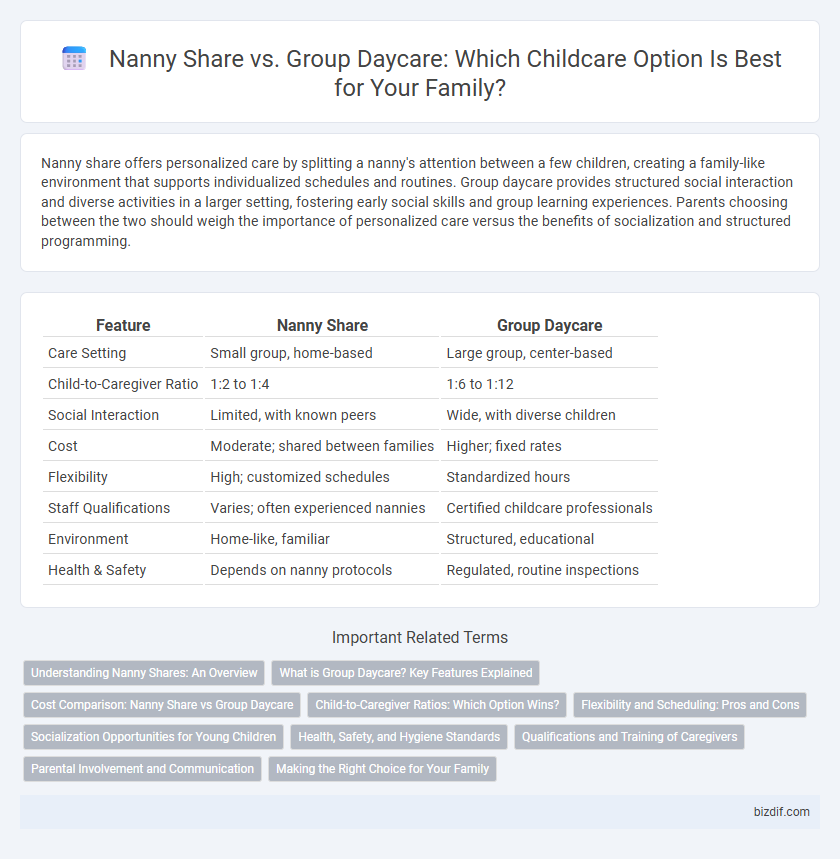Nanny share offers personalized care by splitting a nanny's attention between a few children, creating a family-like environment that supports individualized schedules and routines. Group daycare provides structured social interaction and diverse activities in a larger setting, fostering early social skills and group learning experiences. Parents choosing between the two should weigh the importance of personalized care versus the benefits of socialization and structured programming.
Table of Comparison
| Feature | Nanny Share | Group Daycare |
|---|---|---|
| Care Setting | Small group, home-based | Large group, center-based |
| Child-to-Caregiver Ratio | 1:2 to 1:4 | 1:6 to 1:12 |
| Social Interaction | Limited, with known peers | Wide, with diverse children |
| Cost | Moderate; shared between families | Higher; fixed rates |
| Flexibility | High; customized schedules | Standardized hours |
| Staff Qualifications | Varies; often experienced nannies | Certified childcare professionals |
| Environment | Home-like, familiar | Structured, educational |
| Health & Safety | Depends on nanny protocols | Regulated, routine inspections |
Understanding Nanny Shares: An Overview
Nanny shares offer families a cost-effective childcare option by sharing a single caregiver among multiple children, often in a home setting, fostering personalized attention and flexible scheduling. Unlike group daycare centers, nanny shares typically involve fewer children, which can reduce exposure to illnesses and create a tighter-knit social environment. Understanding nanny shares requires considering factors such as caregiver qualifications, legal agreements, and harmonious family coordination to ensure a successful shared childcare experience.
What is Group Daycare? Key Features Explained
Group daycare involves caring for multiple children in a shared environment, typically in a licensed facility with trained caregivers. Key features include structured routines, social interaction opportunities, and adherence to safety and educational standards. This setting promotes development through guided activities, peer engagement, and professional supervision.
Cost Comparison: Nanny Share vs Group Daycare
Nanny shares typically cost between $10 to $25 per hour per family, offering a more flexible and personalized childcare solution compared to group daycare centers, which range from $15 to $40 per day per child depending on location and enrollment. Group daycare often includes additional fees for activities, meals, and registration, whereas nanny shares can reduce overall expenses by splitting costs between families. Choosing between a nanny share and group daycare depends heavily on budget, preferred care style, and the number of children involved.
Child-to-Caregiver Ratios: Which Option Wins?
Nanny shares typically offer lower child-to-caregiver ratios, often 2-3 children per caregiver, which allows for more personalized attention and tailored care. Group daycares usually maintain ratios around 6-10 children per caregiver, depending on age groups and licensing regulations, providing structured social interaction but less individualized focus. From a child-to-caregiver ratio perspective, nanny shares generally win by ensuring closer supervision and customized interaction for each child.
Flexibility and Scheduling: Pros and Cons
Nanny share offers personalized flexibility with adaptable scheduling tailored to fewer children, making it easier to accommodate individual routines and last-minute changes. Group daycare provides structured schedules with fixed hours, promoting socialization but less accommodation for irregular timings. Families valuing consistent hours may prefer group daycare, while those needing customized timing often choose nanny sharing.
Socialization Opportunities for Young Children
Nanny share arrangements offer personalized socialization with a small group of children, allowing for close-knit interactions and tailored playtime. Group daycare centers provide broader social opportunities with diverse peer groups, promoting varied social skills and adaptability. Both settings foster essential early childhood development but differ in scale and social exposure.
Health, Safety, and Hygiene Standards
Nanny shares often provide personalized attention and a controlled environment, which can reduce exposure to illnesses compared to larger group daycares where higher child density increases the risk of germ transmission. Group daycares implement strict health, safety, and hygiene protocols mandated by regulatory bodies, including regular sanitation, staff training, and emergency readiness, ensuring consistent standards across all children. Evaluating the ability to maintain cleanliness, monitor health symptoms, and enforce safety measures is critical when choosing between a nanny share and group daycare for optimal child well-being.
Qualifications and Training of Caregivers
Caregivers in nanny share settings often possess personalized qualifications tailored to individual child needs, including certifications in CPR and early childhood education, fostering a specialized care environment. Group daycare centers typically require staff to meet standardized state regulations and ongoing professional training, ensuring consistent quality and compliance with safety standards. The structured training in group daycare promotes a diverse learning atmosphere, while nanny shares emphasize a more customized approach to caregiver expertise.
Parental Involvement and Communication
Nanny share arrangements typically offer higher levels of parental involvement and direct communication, allowing parents to collaborate closely with caregivers in a smaller, more intimate setting. Group daycare centers often have structured communication channels, such as daily reports and scheduled meetings, but may limit personalized interaction due to larger child-to-caregiver ratios. Choosing between nanny share and group daycare depends on the desired balance of direct parental engagement and the socialization benefits of a group environment.
Making the Right Choice for Your Family
Choosing between a nanny share and group daycare depends on your family's specific needs, budget, and preferred social environment for your child. A nanny share offers personalized, home-based care with fewer children, fostering closer caregiver-child relationships and flexible scheduling. Group daycare provides a structured setting with diverse social interactions and educational programming, often ideal for children who thrive in larger, stimulating environments.
Nanny share vs group daycare Infographic

 bizdif.com
bizdif.com